Lankao county enjoys notable change

Lankao county in Central China's Henan province had long been plagued by sandstorms, floods and unproductive saline soil. As Party chief of Lankao county, Jiao Yulu (1922-64) mobilized the people to plant paulownia to combat the poor natural conditions during the 1960s.
He became a symbol of the honest Party official who devotes himself tirelessly to the people. His heroic deeds have aroused people's introspection and exploration for the value of survival. People in Lankao have been sticking to that strategy while adapting skillfully to changing circumstances. They improved their living standards and transformed the face of the county.
Paulownia is now helping a new generation of Lankao people to become well-off. In recent years, Xuchang village, Xuyang town, in Lankao county, has become well known across the country as the village of Chinese national musical instrument. The villagers have made full use of the local paulownia resources to develop the musical instrument business, including more than 30 varieties of zither, pipa and guqin. Due to the special climate, soil and other geographical factors, the paulownia in Xuchang village enjoys a reputation for its moderate density and natural texture. Among the similar tree species across the country, the paulownia here is premium for making musical instrument soundboards that boast high acoustic quality and resonance performance.
But it really was quite a coincidence that the people here started to make musical instruments with paulownia. During the 1980s, villagers began to use the felled paulownia trees to make bellows. The bellow has good airtightness, and it is easy to carry because of the light texture of the wood. In addition to the bellows, boxes, cabinets and office equipment made of paulownia wood were popular in those years.
Later, a musical instrument master from Shanghai discovered that paulownia sheet in Lankao was particularly suitable for making musical instruments. He found Dai Shiyong, one of the villagers who was engaged in paulownia wood processing in Xuchang village. Dai agreed to provide paulownia wood panels for the musical instrument factory in Shanghai.
Soon, Dai discovered that he could only earn a few hundred yuan for providing the panel whereas the Shanghai factory could sell for more than 3,000 yuan ($464) for a guqin with a soundboard made of paulownia wood. After succeeding in inviting the Shanghai master to make musical instrument in Lankao, Dai asked his two sons and several lads in the village to learn from the master. These young people grew up living in Lankao, where the poor natural conditions had shaped their strong will. Two years later, everyone had mastered the technique of making guqin.
On top of that, they love their specialty, and they see themselves for the sweat and toil as their biggest joy of life. The production cycle for a handmade guqin in Lankao takes eight months to two years. Now guqin made in Lankao is a famous national brand, and 98 percent of the soundboard market in China is supplied by the people in Lankao.
There are 95 family-style workshops in the village with an annual production of more than 100,000 units and 1,000 employees. The products are now sold throughout the country and more than 20 countries and regions overseas. The annual output value has exceeded 120 million yuan, and the per capita income in the village has reached 50,000 yuan.
Nowadays, the younger generation in Lankao keeps following their fathers' footsteps and continues to compose a beautiful life in the new era with modern business concepts and fashionable cultural insights.
The spirit of Jiao Yulu has come through in the action of the Lankao people. They are open-minded and never conservative. In order to expand the market of the guqin industry, they have cooperated with Alibaba's "Rural Taobao", a platform that enables them to not only sell guqin across the country, but cross the ocean to Singapore, the United States and South Korea.
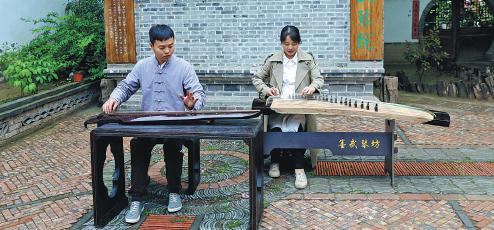
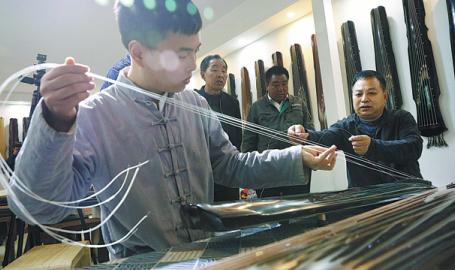
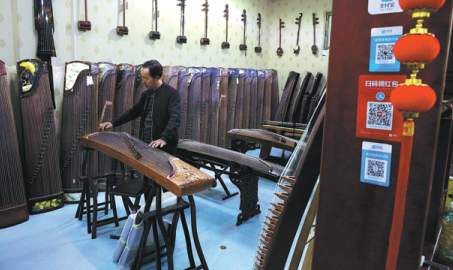
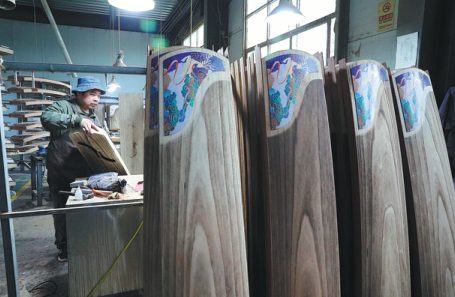
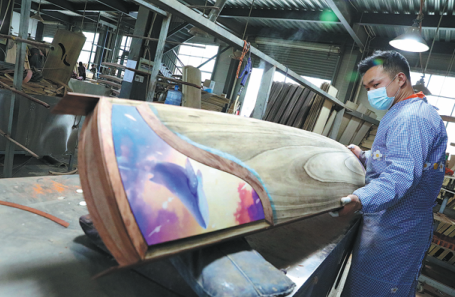
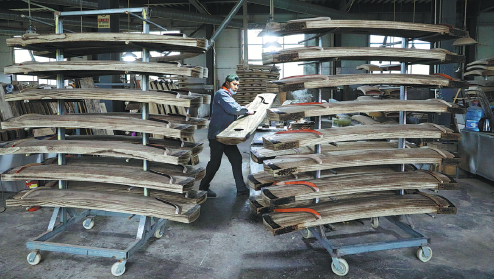
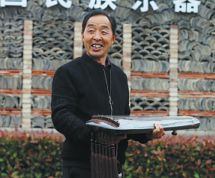
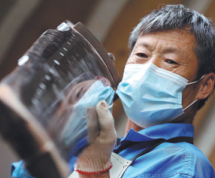
Today's Top News
- Philippines' provocations will avail it nothing: China Daily editorial
- China steps up financial support to spur consumption
- China marks milestone in developing complex deepwater oil and gas reservoirs
- China remembers victims of Nanjing Massacre, 88 years on
- New plan will be a road map for a stronger future
- Taiwan's character of the year a vote against confrontation






























